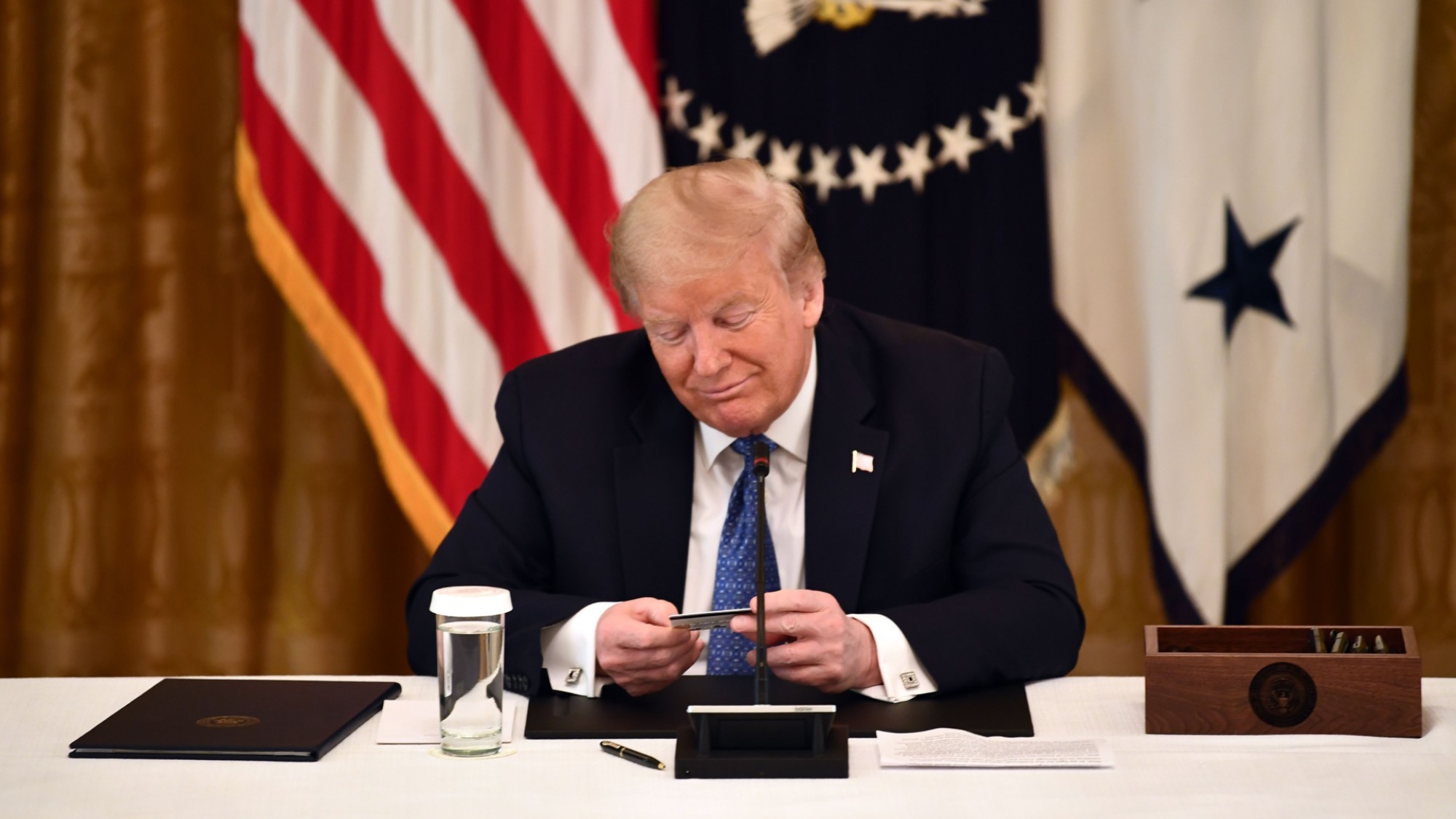Will Trump (and Sanders) cut credit card rates?
Common ground is possible. But there's a catch.


A free daily email with the biggest news stories of the day – and the best features from TheWeek.com
You are now subscribed
Your newsletter sign-up was successful
Can bipartisanship survive in Donald Trump's Washington? Credit cards might offer a way. Trump has talked about capping credit card interest rates — a position also endorsed by progressives like Sens. Bernie Sanders (I-Vt.) and Elizabeth Warren (D-Mass.).
Warren has signaled an eagerness to work with Trump on the issue. "If Donald Trump really wants to take on the credit card industry, count me in," she said in a social media post. Sanders, too, is ready to work with Trump on capping the fees. If Trump follows up on his campaign pledge to limit credit rates to 10%, Sanders told The New York Times, "absolutely I will be there."
"There's a catch," Natasha Sarin said at The Washington Post. Americans right now face credit card rates that can climb above 20%, so a new limit "sounds like a win for struggling Americans" who face "hefty costs" when trying to pay down their debt. But the card companies like Visa and Mastercard say rate limits mean they'll be less likely to issue cards to risky borrowers — who might then turn to payday lenders who charge even higher rates. Credit cards "won't be as easy to get," said Sarin.
The Week
Escape your echo chamber. Get the facts behind the news, plus analysis from multiple perspectives.

Sign up for The Week's Free Newsletters
From our morning news briefing to a weekly Good News Newsletter, get the best of The Week delivered directly to your inbox.
From our morning news briefing to a weekly Good News Newsletter, get the best of The Week delivered directly to your inbox.
Bringing Trump to the table
Finding common ground on credit cards is part of the "new progressive strategy for warring with Trump," said Politico. Democrats like Sanders and Warren can navigate a second Trump presidency by taking his "populist, working-class proposals at his word." If they succeed, they get credit for "bringing him to the table" on progressive priorities, and if not, "they can bash him for it," said Politico. If Trump can't follow through on his campaign promise to cap rates, Warren said, "then he should be held accountable."
But success in this case means "only people with strong credit ratings would be able to borrow money on their cards," Tyler Cohen said at Bloomberg. Americans with "lower net wealth, or poorer payment histories" would be blocked from obtaining credit cards "because they would no longer be profitable to serve." Citizens are more qualified to determine than the government how best to use their financial resources, Cohen said. "Be wary of any politician who sides with the government on this question."
Will Trump's 'populist streak' win?
The financial markets are betting that "Trump won't fix high card rates," said The Wall Street Journal. Following the election, card lenders became "some of the best-performing stocks" in evident anticipation of favorable "regulatory changes" under the new president. But there should be some caution on those companies' part: Trump's "populist streak" might win out, and so might the instincts of Vice President-elect J.D. Vance, who in the Senate co-sponsored a bill to limit rates.
Americans have $1.14 trillion in credit card debt, said CNN. That's a "record high," and an average of $6,500 in debt for every single person. But lenders may have good reason to believe that a cap isn't actually in the cards: Similar plans have often "stalled in Congress." If a cap passes, said LendingTree analyst Matt Schulz, companies might respond by eliminating credit card rewards programs in order to preserve their profits. "The house," he said, "always wins."
A free daily email with the biggest news stories of the day – and the best features from TheWeek.com
Joel Mathis is a writer with 30 years of newspaper and online journalism experience. His work also regularly appears in National Geographic and The Kansas City Star. His awards include best online commentary at the Online News Association and (twice) at the City and Regional Magazine Association.
-
 Antonia Romeo and Whitehall’s women problem
Antonia Romeo and Whitehall’s women problemThe Explainer Before her appointment as cabinet secretary, commentators said hostile briefings and vetting concerns were evidence of ‘sexist, misogynistic culture’ in No. 10
-
 Local elections 2026: where are they and who is expected to win?
Local elections 2026: where are they and who is expected to win?The Explainer Labour is braced for heavy losses and U-turn on postponing some council elections hasn’t helped the party’s prospects
-
 6 of the world’s most accessible destinations
6 of the world’s most accessible destinationsThe Week Recommends Experience all of Berlin, Singapore and Sydney
-
 Currencies: Why Trump wants a weak dollar
Currencies: Why Trump wants a weak dollarFeature The dollar has fallen 12% since Trump took office
-
 TikTok: New owners, same risks
TikTok: New owners, same risksFeature What are Larry Ellison’s plans for TikTok US?
-
 Trump wants a weaker dollar, but economists aren’t so sure
Trump wants a weaker dollar, but economists aren’t so sureTalking Points A weaker dollar can make imports more expensive but also boost gold
-
 Leadership: A conspicuous silence from CEOs
Leadership: A conspicuous silence from CEOsFeature CEOs were more vocal during Trump’s first term
-
 The end for central bank independence?
The end for central bank independence?The Explainer Trump’s war on the US Federal Reserve comes at a moment of global weakening in central bank authority
-
 Can Trump make single-family homes affordable by banning big investors?
Can Trump make single-family homes affordable by banning big investors?Talking Points Wall Street takes the blame
-
 Phish food for thought: Ben & Jerry’s political turmoil
Phish food for thought: Ben & Jerry’s political turmoilIn the Spotlight War of words over brand activism threatens to ‘overshadow’ the big ice cream deal
-
 What a rising gold price says about the global economy
What a rising gold price says about the global economyThe Explainer Institutions, central banks and speculators drive record surge amid ‘loss of trust’ in bond markets and US dollar
